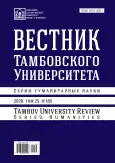Fair trade in Akmola Region of the Steppe territory in the second half of the 19th – early 20th centuries
- Authors: Alpyspaeva G.A.1
-
Affiliations:
- Saken Seifullin Kazakh Agrotechnical University
- Issue: Vol 25, No 185 (2020)
- Pages: 239-248
- Section: FOREIGN COUNTRIES’ HISTORY
- URL: https://journal-vniispk.ru/1810-0201/article/view/298620
- DOI: https://doi.org/10.20310/1810-0201-2020-25-185-239-248
- ID: 298620
Cite item
Full Text
Abstract
We present the development history of fair trade and fairs in the Akmola Region of the Steppe territory in the second half of the 19th – early 20th centuries. We show the dynamics of fair number and the geography of their distribution in the counties of the region. We analyze the range of goods at the fairs, total trade and directions of goods flows, identify growth causes and factors of the fair trades in the Akmola Region and substantiate importance of the fairs in development of commodity-money relations and formation of a market space in the region. The historical importance of the Akmola fairs was that there was a commercial and economic development of the Asian outskirts of the Russian Empire due to them, and also tasks of promoting the goods from Asian regions to the all-Russian market were solved. The Kazakh steppe attracted Russian capital as a market for cheap raw materials and a market for industrial products of the central regions of the country due to the underdevelopment of industry in the region. The fairs in the Akmola Region attracted a wide population of the region into trades, which ensured their stability and gradual growth. The fairs promoted development of various crafts and handicraft industries among the local population.
Keywords
About the authors
G. A. Alpyspaeva
Saken Seifullin Kazakh Agrotechnical University
Author for correspondence.
Email: galpyspaeva@mail.ru
ORCID iD: 0000-0002-0672-8292
Doctor of History, Professor, Professor of Kazakhstan History Department
62 Zhenis Ave., Nur-Sultan 010011, Republic of KazakhstanReferences
- Shcheglova T.K. Yarmarki Zapadnoy Sibiri i Stepnykh oblastey vo vtoroy polovine XIX v. Iz istorii rossiysko-aziatskoy torgovli [Fairs of Western Siberia and the Steppe Regions in the Second Half of the 19th Century. From the History of Russian-Asian Trade]. Barnaul, 2002. (In Russian).
- Shcheglova T.K. Sel’skokhozyaystvennaya torgovlya Zapadnoy Sibiri i Stepnogo kraya na mezhregional’nykh yarmarkakh (Irbitskoy, Ishimskoy, Tyumenskoy) v nachale XX veka: novyye tendentsii [Agricultural commerce in western Siberia and Steppe Region at trans-regional fairs (Irbitskaya, Ishimskaya, Tyumenskaya) in the beginning of the 20th century: new tendencies]. Vestnik Kemerovskogo gosudarstvennogo universiteta – Bulletin of Kemerovo State University, 2015, no. 3-1, pp. 81-85. (In Russian).
- Sidorchuk O.N. Sibirskiye yarmarki kak kul’turno-zrelishchnyye tsentry (XIX – nachalo XX v.) [Siberian fairs as cultural and entertainment centers (19th – early 20th centuries.)]. Mezhdu proshlym i budushchim: Voprosy istorii i istoricheskogo obrazovaniya [Between Past and Future: Issues of History and Historical Education]. Novosibirsk, 2000, pp. 65-79. (In Russian).
- Kalinina N.Y. Yarmarki Zapadnoy Sibiri v kontekste teorii istoricheskoy dinamiki kul’tury [Fairs in West Siberia as a side of theory by historical culture’s changes]. Kul’tura i tsivilizatsiya – Culture and Civilization, 2018, vol. 8, no. 1A, pp. 111-117. (In Russian).
- Alpyspaeva G.A., Sayahimova S.N. The role of the merchant class in the development of the provincial city of Akmolinsk (the second half of the 19 – the beginning of the 20th centuries. Bylyye gody. Rossiyskiy isto-richeskiy zhurnal – Bylye Gody. Russian Historical Journal, 2018, vol. 48, no. 2, pp. 688-698. doi: 10.13187/bg.2018.2.688
- Kereibayeva A.S., Mamyrbekov A.M., Levchenko T.P., Ziyadin M. Fair trade of the merchantry of the Steppe Region of the second half of the 19th century and beginning of the 20th century. Bylyye gody. Rossiyskiy istori-cheskiy zhurnal, 2019, vol. 53, no. 3, pp. 1201-1210. doi: 10.13187/bg.2019.3.1201
- Bekmakhanov E. Prisoyedineniye Kazakhstana k Rossii [Accession of Kazakhstan to Russia]. Moscow, 1957. (In Russian).
- Abylkhozhin Z.B. Traditsionnaya struktura Kazakhstana: sotsial’no-ekonomicheskiye aspekty funktsionirova-niya i transformatsii (1920–1930 gg.) [The Traditional Structure of Kazakhstan: Social and Economic Aspects of the Functioning and Transformation (1920–1930)]. Almaty, 1991. (In Russian).
- Alpyspayeva G.A. Astana v novoye i noveysheye vremya [Astana in Modern and Contemporary History]. Asta-na, 2008. (In Russian).
- Sungurov P.A. The development of butter production in the regions of Western Siberia at the beginning of the 20th century. Bylyye gody. Rossiyskiy istoricheskiy zhurnal – Bylye Gody. Russian Historical Journal, 2018, vol. 50, no. 4, pp. 1695-1702. doi: 10.13187/bg.2018.4.1695
Supplementary files








